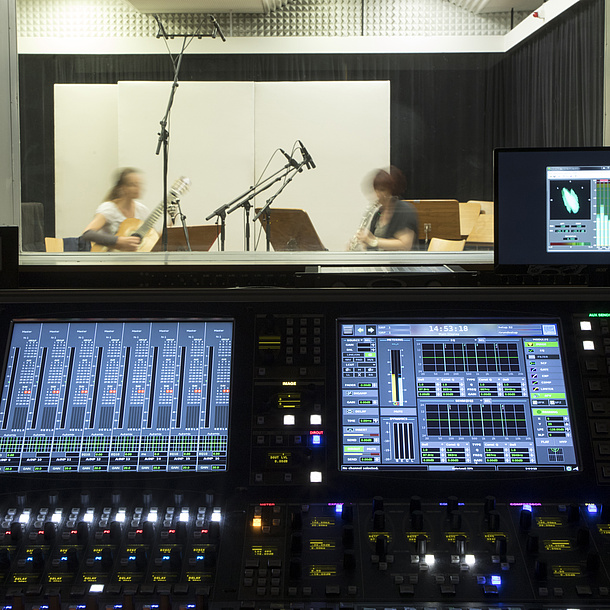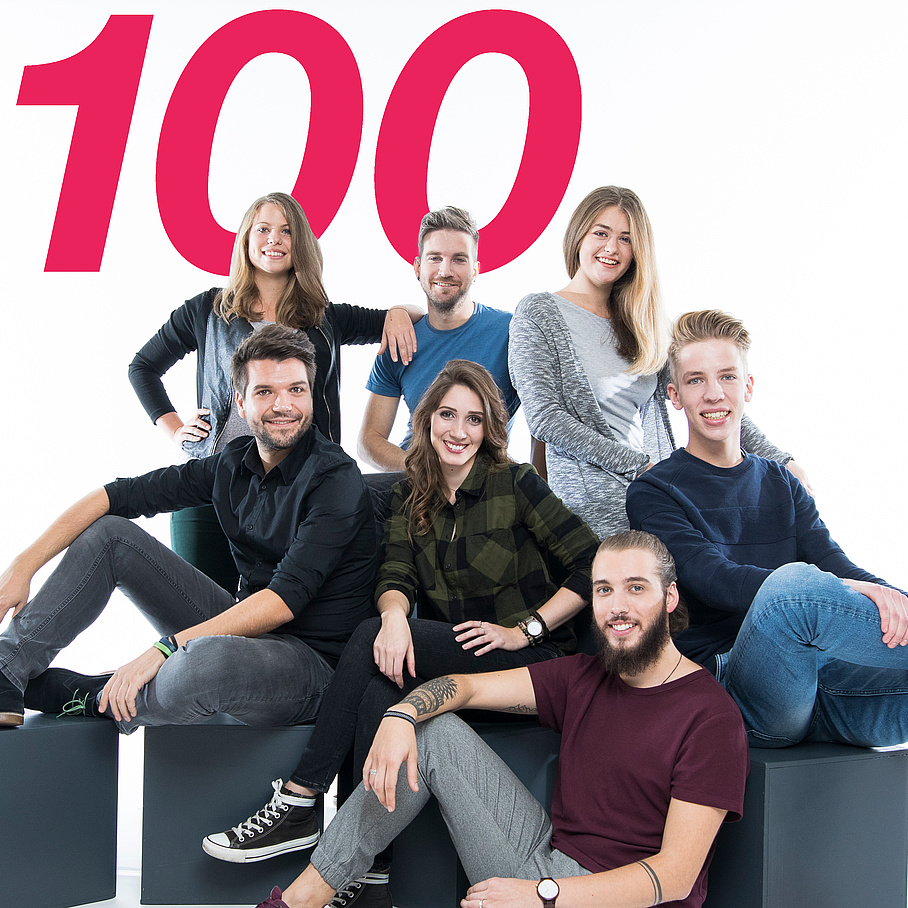Quick Facts
- Duration of study: 6 semesters
- ECTS credit points: 180
- Academic degree: Bachelor of Science (BSc)
- Language of instruction: German
The Bachelor's Programme
The degree programme has an excellent international reputation. In this programme, you benefit from access provided to two excellent universities: TU Graz and the University of Music and Performing Arts Graz (KUG).
The Bachelor's Programme in Electrical Engineering and Audio Engineering provides a broad scientific education in the field of audio engineering. Once you have acquired fundamental mathematical and physical knowledge, as well as a basic education in music theory and music practice, you will acquire specialised knowledge in electrical engineering, signal processing, acoustics and computer science. You will deepen your musical expertise through ear training and instrumental lessons. You will also hone your ability to analyse, model and digitally simulate audio-technical or acoustic situations.
Students have access to and the opportunity to use excellent infrastructure. This includes the teaching studios and acoustic measuring stations at TU Graz and the KUG and especially the “CUBE”, a replay room for 3D spatial audio simulation at the KUG. Students can deepen their theoretical knowledge in numerous laboratories and discuss questions that arise as a result of the practical application of this knowledge.
Due to the limited number of students admitted to the programme, individual supervision is possible, which is highly beneficial. This supervision takes the forms of individual artistic training and lessons in small groups (groups of 2, 3 and 6 students), especially in the cases of laboratories and bachelor’s theses.
Play video
Studying Electrical Engineering and Audio Engineering
Focus Areas
You can specialise in the following subject areas:
Basics of Mathematics and Science: You will learn how to use linear algebra, differential equations and probability theory and learn how to look at technical problems from a physical point of view.
Basics of Electrical Engineering: You will learn about DC and AC networks as well as components and devices used in electrical engineering. In addition, you will learn about electrical networks and system dynamics as well as electrodynamics. You will be able to measure, e.g. the current and voltage passing through network components and improve your understanding of electrical and magnetic fields.
Electronics and Information Engineering: You will learn, e.g. how to analyse and scale electronic and digital circuits and gain practical experience with the most important basic circuits used in analogue and digital technology. In the area of communications engineering, you will learn how information is transmitted by means of electromagnetic waves and which interference factors have to be taken into account.
Computer Science: You will learn about the structure and functionality of computer systems and gain fundamental training in object-oriented programming, receiving an introduction to Phyton and Matlab.
Audio Engineering and Acoustics: You will acquire the ability to categorize e.g. musical instruments based on their sound generation and to plan a room acoustically. You will become familiar with acoustic measurement technology, the functioning of loudspeakers and microphones and digital audio technology.
Studio and Recording Technology: You will learn how to independently operate all the equipment normally found in a studio and make recordings from small ensembles to large symphony orchestras.
Basics of Music and Computer Music: You will be introduced to the methods used for sound synthesis and sound design possibilities such as intervals, chords, modulations, timbres and rhythms.
Study counselling: Check what you expect!
What will I have to do in the first semesters? How much practice can I expect? And what can I actually do with my degree when I've finished? Check what you expect!
A student and a lecturer will take time for all your questions and you will get to know TU Graz during on-site appointments. Up to 10 persons can participate at each date.
Contact: lse@tugraz.at

I would recommend this course to anyone interested in the fascinating interaction of art and technology. Students come from many countries to take part in this unique degree programme in Graz. There is a great team spirit which helps us to master challenges together.
Electrical Engineering and Audio Engineering in Research and Industry
Although barriers between technology and art have traditionally been quite rigid, these can be overcome; this can clearly be seen in this degree programme.
Wherever new media technology and art meet, electrical engineers and sound engineers can be found in industry, e.g.
- as studio, live recording and HiFi equipment developers.
- as acoustic specialists who work in the automotive industry, in fields where noise reduction or customised room acoustics are needed, in the development of measurement applications and psychoacoustic test series, in industrial sound design or in the development of hearing aids.
- as signal processing specialists for the development of communication technologies, speech and audio processing algorithms.
- in the field of multimedia as sound designers and music producers, radio and sound engineers, or developers of audio applications.
Carrying out innovative research projects in the fields of 3D audio playback and room acoustic design provides valuable results. These have made important contributions to society, for example, support the further development and research on the electrolarynx, a medical device that is used as a speech aid for people without a larynx.
Joint Degree Programme
The Bachelor’s Programme in Electrical Engineering and Audio Engineering is an inter-university degree programme jointly offered by the Graz University of Technology (TU Graz) and the University of Music and Performing Arts Graz (KUG). You can take courses at both universities and can also choose the university at which you register for admission. Student representatives for Electrical Engineering and Audio Engineering are available at both universities and help answer questions you may have about your studies.
Admission
Admission
Requirements for admission to a Bachelor's degree programme
1. Entrance examination
Before registering for the degree programme, you will take the entrance examination at the University of Music and Performing Arts Graz (KUG).
Application deadline for the entrance examination: the whole year round until 3 June.
Detailed information and registration for the entrance examination
2. Admission
After passing the entrance exam you can register within the deadlines:
- Austrian students: Initial Registration for a Degree Programme
- International students: Admission and deadlines for international applicants
Questions about admission?
Contact study@tugraz.at
Admission Deadlines
Winter semester 2025/26
Admission period: 7 July to 31 October 2025
Summer semester 2026
Admission period: 7 January to 5 February 2026
Perspectives for Graduates
Professional Fields
Electrical engineering and audio engineers who have received their degrees in Graz are strongly in demand internationally due to their expertise. This degree programme is unique in Europe, and the career prospects in the following fields are correspondingly good:
- Vehicle acoustics and automotive industry
- Room and building acoustics planning
- Electroacoustic development
- Digital signal processing
- Speech communication
- Software development
- Sound synthesis and sound design
- Sound engineering and studio technology
- Installation art and multimedia
- Sound installations and live electronics
In addition, graduates of the Bachelor's Programme in Electrical Engineering and Sound Engineering qualify for admittance to the Master's Programme in Electrical Engineering and Sound Engineering and, with additional qualifications, can also apply to enter other master's programmes.
Advanced Master’s Degree Programmes
After completing the bachelor's degree programme, you can enrol in the following master’s degree programmes without further requirements:
- Electrical Engineering and Audio Engineering
- Space Sciences and Earth from Space
- Electrical and Electronics Engineering
- Information and Computer Engineering
Information on other master's degree programmes with requirements you can find on the respective pages for the master’s degree programmes.
In addition, the bachelor's degree offers you the opportunity to apply internationally for master's degree programmes.




